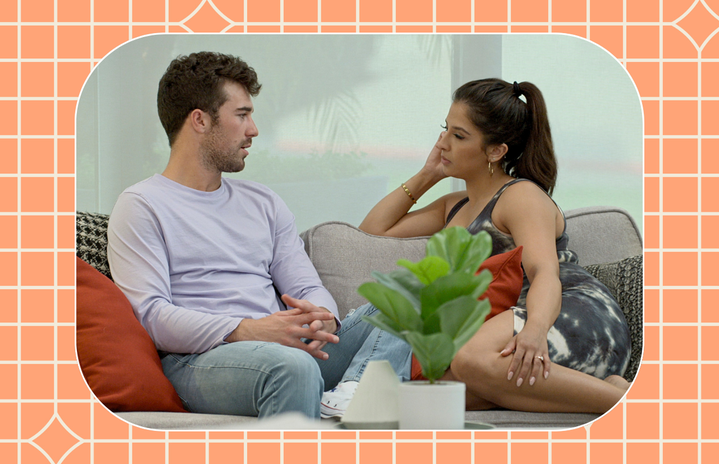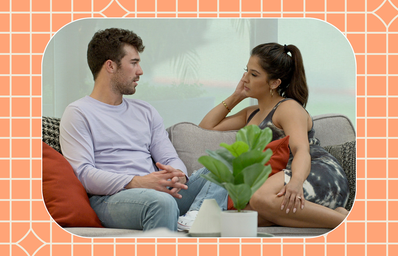**Disclaimer: This article is written based off of my experience and what I have found works best for me. This means, these things are not guaranteed to benefit everyone/every situation.
I find it’s really important to think about what I want out of each relationship I have with people. It’s not easy to accept that some relationships won’t exactly meet the expectations you envisioned. Not every person is going to put the same amount of effort into a relationship as you plan to. Some people are better as a friendly face or acquainted peer. It’s difficult to accept these relationships at times, especially if you have been friends with this person for a while. You may not see the changes you are looking for which leads you discouraged or disappointed.
I have found that the conversation or the action I choose can have a huge impact on the way myself or the other person views the relationship. I would say over the course of starting college, I began to realize that I never took the time to deeply consider what I needed in relationships. I always let them kind of just happen and not take the time to actually think about what I needed to change or what I needed from the other person. This has been from both dating and friendships. Going to college is a huge shift in life, there is a lot of unknown and self-discovery. It’s a new space with lots of opportunities to meet others and try new things. The bonds we form with people are intense and can develop very quickly since we spend so much time with the people on campus. We have the choice of roommates, Greek life or whatever other organizations we want to join. When we have free time, we can spend it however with whoever we want. As you spend more time with these people, the relationships you have will probably shift. I found it’s important to step back and consider how to handle those situations. I’ll tell you what I have tried or thought of doing, and hopefully you’ll find something that works for you!
I, first, like to take the time to brainstorm and analyze just maybe why I am friends with a person. I have to consider what I want from a relationship and how to achieve it. There are people in life you might not be close with; there are your friends who may be more like surface level acquaintances; your friends that you do some stuff with; and of course, your close inner circle. You don’t have to do this for every person you are friends with. I focus on the ones where I’m unsure if they are just someone I’m friendly with, or someone I can’t be without. Sometimes it can be hard to differentiate which ones are genuinely your people, and that’s where I find communication or analyzing to be so important.
I’ve had many people in my life that I expected or thought I would receive more from but ended up disappointed. I didn’t think about how in the long run it would hurt me to not have these conversations, but also how much time and energy I would have saved. People can’t read your mind. Being clear and to the point has helped me express myself and allow other people to understand where I am coming from. I come up with a list of things I want to discuss or I even just take some time to think about it even if I don’t write it down. When I don’t make my expectations clear, that’s when I realized what I get out of it may not live up to my unspoken expectations.
Now, let’s get to the ways to communicate that I have found work for me. One thing is to set up a time to have a conversation. This can honestly be anywhere, but it should be in a space that’s comfortable. This could be a somewhat tough discussion to have, so it’s important that everyone is in the safest place possible. When having the conversation, it’s important to hear the other person’s perspective. The things the person may be saying could be critical or statements that are hard to agree with, but waiting until there is a time after the person is done talking to correct or add any comments is very important. It’s important to be a good listener that is respectful and engaged. In my experience, if I am not going to really take in what the person has to say, then I should reconsider why we are having the conversation. I typically offer taking turns sharing the points both of us may have prepared ahead of time, or whoever decided to suggest having the conversation can start off. I make sure I’m speaking in a tone that is calm, rather than yelling or being aggressive. Becoming hostile can be a turn off in having a successful conversation. It’s ok to get emotional or frustrated, but that needs to be communicated with the other person. I sometimes split it into mini sessions or incorporate breaks to have time to reset and cool off. If it’s getting overly intense, it can lead to becoming unproductive. At times, we need to step back before returning to that space and continuing.
Sometimes meeting in person isn’t always my best option. The conversation may not need to be long either, or just that we’re both busy and can’t find time. I prefer meeting in person since it’s easier to read the body language and tone of the person, because sometimes over text or FaceTime it can be difficult for me to see all of those cues. I find that texting is a good way to include all my thoughts put together in the way I want them. When I’m in person, I can’t always have control of the conversation or where it’s going. At least with texting, the person I’m talking to can read through everything, and figure out how they want to respond and then add anything they would like to. I do this sometimes with a person over smaller things or I use this method to clarify something. If something is said over text or during a conversation I had in person and it was really bothering me — it’s ok to feel that way — but sometimes we need to just ask the person what they meant by it. It’s important these things don’t blow out of proportion. So, I typically send a quick message and ask them. It’s better to ask than to have all of these feelings building up to the point where you resent a person.
I want to go a little more in depth about why I will send quick messages to people to clarify. There have been times when I’m hanging out with my friends, and I’ll notice there is a change in their body language or tone in their voice. They might begin being distant from me or won’t really be talking. If I know that we have been fine recently, I get really confused. That makes me wonder why they’re acting that certain way. I don’t always like to do it on the spot because if the situation just happened or they aren’t ready to tell me. It might be really uncomfortable while I’m there but in the long run I want to be supportive of that person. I’ll normally try to make the best of the hangout and afterwards I send a text to check up on them. I am very guilty of thinking it’s something I did and believing I’m the problem. It builds up tension and frustration for me, but the other person isn’t aware I’m feeling those emotions. If I send a text to ask them it helps them recognize the way they were acting towards me. Also, they need to let me know when they’re having a difficult time, so I know what they want me to do. Asking or having them give clarification prevents further confusion but can also save your relationship from being damaged.
As I mentioned previously, it’s incredibly important to be open and honest when something is bothersome or upsetting. Sometimes, it may not revolve around the person, but it could be a personal issue or something else that might have happened that day. I usually say something like “Hey, I just want you to know I’m going through some stuff at the moment, so I may not be acting like myself at the moment.” Another option I use is, “Hi, I’m feeling a little sad right now, I really could use support and a hug.” Things like these statements inform the person of my needs or wants and can prepare me to help in those situations. This makes it where the person isn’t surprised by my actions or doesn’t think that they did something wrong. When I am straight forward, it makes a better situation for the both of us. Again, people can’t read minds, but if you share with them, they can do a lot more for you.
I had a friend that I would set a time once a month to facetime (our friendship was long distance because of COVID) where we caught up with each other and also talked about anything we were going through. We would also discuss what we needed from one another and asked each other what the other one would maybe need to work on. For example, my friend may have asked me to wait until the end of the story to state my thoughts or options because sometimes I would interrupt them. They asked if they could finish the story and hear them out because it made them feel bad when they couldn’t talk without being interrupted. After she told me that, I realized in fact that I did do that a few times, and I needed to work on not doing that. What I’m trying to say is that if you really take the time to work on respecting and communicating, the relationships will be a lot stronger. It makes it easier to problem solve and there won’t be as many bumps. When you do have bumps, you guys will better know the best solution.
Another method I’ve tried doing is writing each other letters. This is a good way to literally write anything you want to say without having to go back and forth or not feeling sure if you can say it. This way, everything it said at once, and the person can read it. Afterwards, the two of us can go over any points in the letter that we find necessary to spend more time on. I used to do with a friend who struggled to express themselves, especially when it came to their thoughts and emotions on touchy subjects. Sometimes it wasn’t full on letters, but bullet points of things we wanted to go over. I have written letters for people because sometimes I have way too many thoughts, and I need to do it in an efficient way. I don’t necessarily ask the other person to do so sometimes, but it depends on the situation I’m having.
Regardless of what method or way you decide to approach the person, don’t blame them for everything. Even if you believe that it’s their fault, it can be a lot to take in so much criticism at once. Instead, I like to restate it as something that can be improved or worked on. For example, if the person doesn’t let me know that they will be busy with their family for the day and doesn’t answer their phone, and when they do finally, they only give one-word answers. What you shouldn’t do is say “You didn’t answer me which means you don’t like me! You must hate me and think I’m a boring person!” Our brains make us assume or come to conclusions without evidence sometimes. It can be really hard to not have answers when we really need or want them. We try to fill in those gaps, to get closer or at peace. I’m someone who will analyze a text message or situation to the core. It will lead me in loop hoops and get me basically nowhere. I have tried to work on not doing this as much, because it’s so draining mentally and physically. Which is why I try not to attack the person with those types of statements. I’ve really tried to make the effort of rephrasing my wording to say things like “Hey, I noticed that you weren’t very responsive today, is everything alright?” If they say everything is good and explain why they didn’t answer then I’ll respond with something along the lines of ” I completely understand why you didn’t answer, but would you mind letting me know beforehand? It can be misleading, and I felt that maybe you didn’t want to talk to me. I felt very hurt at the moment, but I realized that I had a misunderstanding.” Saying something like that allows the person to take in how I felt, but also realize that they need to work on stuff as well. There will be a possibility of the other person feeling hurt or sad, but it can be a lot to take in. There also isn’t a way to predict how they will acknowledge the topics, but I can control how I state things and react. If I appear upset and heated, it may be difficult to get my message across. Plus, it could discourage other people from wanting to try to work things out with me. Just be very mindful and treat others the way you want to be treated.
Something I know helps me, and might help you, is talking to either a therapist or someone I feel comfortable sharing my thoughts and feelings with. It can be another perspective and possibly something that I didn’t think of before. A therapist has the experience and knowledge to help me with those types of situations. It can help to have someone who wasn’t there when it happened to look at it from a different viewpoint. I might not always be able to see the other person’s side in the moment or just a general outside view. When a situation occurs, I get so caught up that I may miss important details. It can also be helpful to ask someone to listen who knows all parties in part the situation. When they know everyone, they have a feel of how each person is and can help come up with ideas to help the situation. I sometimes consider having a person to mediate. It doesn’t hurt to have another person in the room if things get out of hand. This person simply is in the room to be there if assistance is needed and to deescalate the situation. I personally haven’t needed someone to do this with me, but I have done it for other people. It’s nice knowing they’re there when people don’t know where to start to help guide them with the conversation.
My last thing I want to add is that it’s ok to need time and space before having a conversation. It’s ok if I’m not ready or I’m still processing my thoughts. Going into a conversation not feeling ready is going to be a challenge. Depending on what it is, I would definitely wait a few hours or days. Sometimes I need to cool off and recollect myself before trying to have a mature and meaningful conversation. It’s ok if I’m still not ready when the person asks to have a conversation. I have told people before that I’m not going to text for a few days. I let them know I want to talk once I have processed my thoughts and I’m not overwhelmed with my emotions. It will prevent further damage and ensure I am in a better head space. Trying to have a conversation right after a huge fight isn’t always the right idea.


